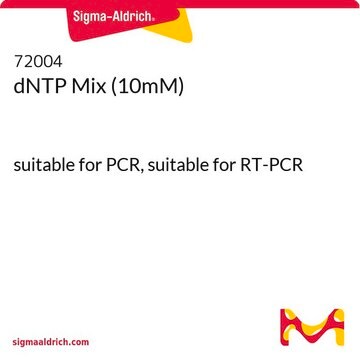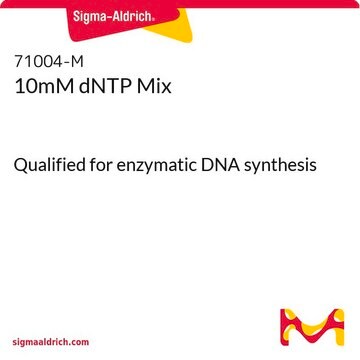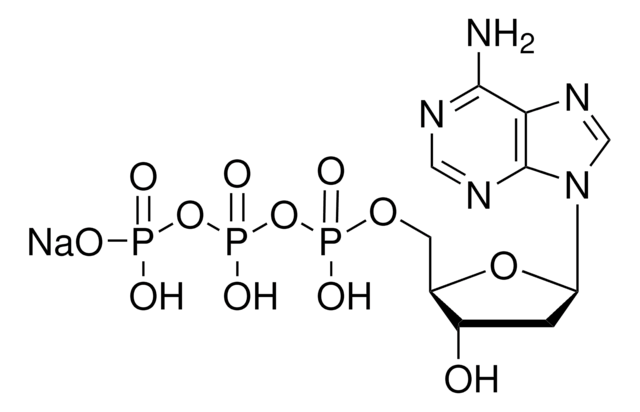DNTP10
Deoxynucleotide Set, 10 mM
Individual dNTPs for routine PCR; 0.5 mL each
Synonym(s):
10mM dNTP set, DNTP 10 mM solution, dNTP set, dNTPs
Sign Into View Organizational & Contract Pricing
All Photos(1)
About This Item
UNSPSC Code:
41106305
NACRES:
NA.52
Recommended Products
General description
Deoxynucleoside triphosphates (dNTPs) are substrates for DNA polymerizing enzymes and are the essential building blocks of nucleic acid molecules. It aids in the synthesis of copies of the target DNA by providing each of the four bases (dATP, dGTP, dCTP, dTTP).(2) dNTP is a key component of PCR master mixes as it is necessary for DNA amplification reaction.
Application
Deoxynucleotide Set, 10 mM has been used in:
- polymerase chain reaction (PCR)
- nested PCR
- DNA repair
- the preparation of DNA-duplex
Packaging
0.5 mL each of 10 mM dATP, dCTP, dGTP and dTTP
related product
Storage Class Code
10 - Combustible liquids
Choose from one of the most recent versions:
Already Own This Product?
Find documentation for the products that you have recently purchased in the Document Library.
Customers Also Viewed
Nicolas A Gillet et al.
Methods in molecular biology (Clifton, N.J.), 1582, 127-141 (2017-03-31)
We describe here a method to identify the position of retroviral insertion sites and simultaneously to quantify the absolute abundance of each clone, i.e., the number of cells having the provirus inserted at a given place in the host genome.
Thomas M Dechiara et al.
Methods in molecular biology (Clifton, N.J.), 530, 311-324 (2009-03-07)
With the completion of the human and mouse genome sequences and the development of high-throughput knockout mouse technologies, there is now a need for equally high-throughput methods for the production of mice for phenotypic studies. In response to this challenge
Genetic (RAPD) diversity in two Armadillidium vulgare populations
Homor P, et al.
Tissue Antigens, 34, 19-22 (2003)
Chapter 8 - DNA Sequencing
Clark D P, et al.
Molecular Biology of the Gene, 240-269 (2019)
Jiannis Ragoussis et al.
Methods in molecular biology (Clifton, N.J.), 338, 261-280 (2006-08-05)
Recent studies on genome-wide localization of transcription factor (TF) binding to DNA have shown that a large proportion of identified sequences do not contain consensus motifs predicted by databases of transcription factor binding sites, such as TRANSFAC. The main limitation
Our team of scientists has experience in all areas of research including Life Science, Material Science, Chemical Synthesis, Chromatography, Analytical and many others.
Contact Technical Service









